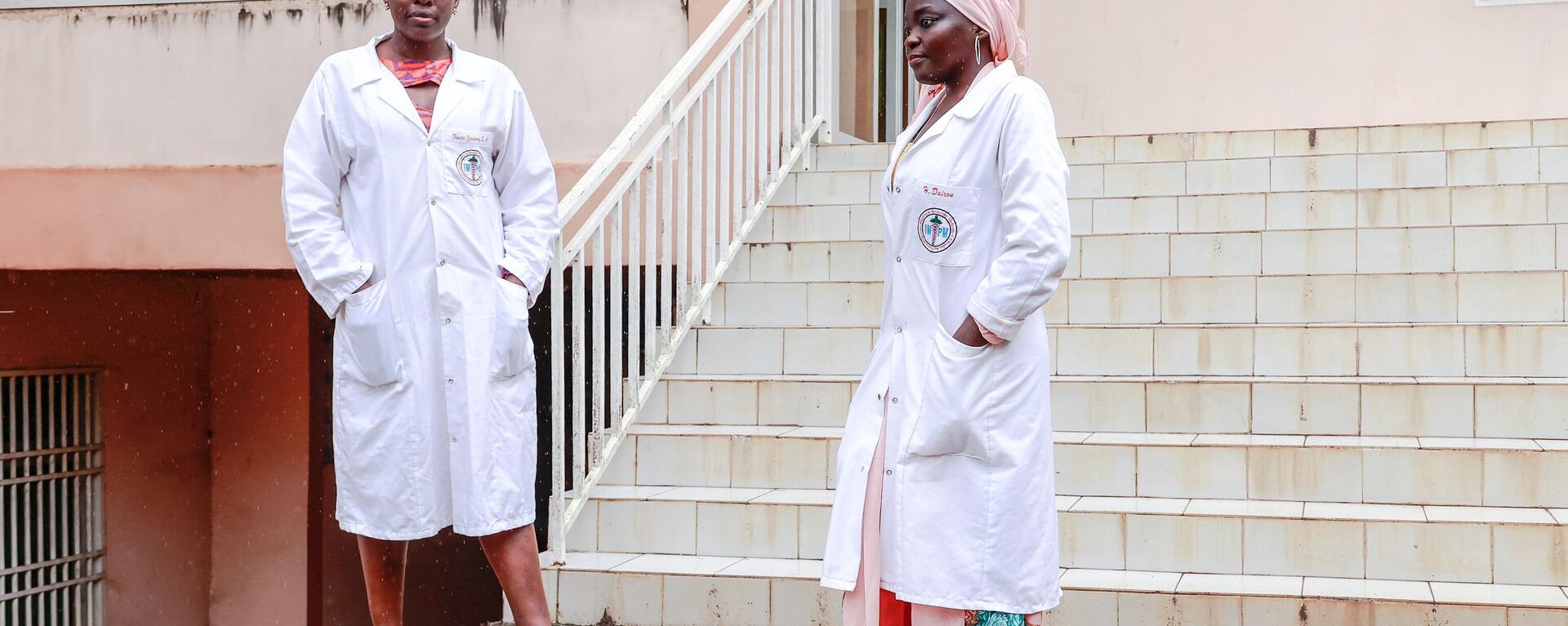https://en.sputniknews.africa/20240219/sierra-leonean-medical-student-in-russia-talks-about-his-journey-and-medicine-in-africa-1065138813.html
Sierra Leonean Medical Student in Russia Talks About His Journey and Medicine in Africa
Sierra Leonean Medical Student in Russia Talks About His Journey and Medicine in Africa
Sputnik Africa
In an interview with Sputnik Africa, Sama Kailondo Banya, a sixth-year medical student at Peoples' Friendship University of Russia (RUDN) who hails from Sierra... 19.02.2024, Sputnik Africa
2024-02-19T09:24+0100
2024-02-19T09:24+0100
2024-02-19T09:43+0100
opinion
africa in details
russia
soviet union (ussr)
sierra leone
west africa
education
healthcare
health
https://cdn1.img.sputniknews.africa/img/07e7/0a/1c/1063134114_0:160:3072:1888_1920x0_80_0_0_78faa3cceea59742ff1d150dec37ad57.jpg
Banya reflected on his childhood fascination with science and medicine, nurtured by familial influences of medical professionals. Inspired by his uncle, a doctor trained in the Soviet Union, Banya's decision to pursue medicine was reinforced by the opportunity to study in Russia through government scholarships, a tradition dating back to the Soviet era.Reflecting on his six-year educational journey in Russia, Banya emphasized the immersive learning experience offered by Russian medical institutions.From anatomy to clinical rotations, he highlighted the practical exposure provided, enabling students to comprehend medical concepts beyond textbooks.Banya also underscored the transformative potential of acquired knowledge and skills upon returning home and expressed optimism about leveraging advanced medical technologies and techniques learned in Russia to address healthcare challenges in Africa, particularly in fields like cardiology and infectious diseases.Banya said he is personally interested in the cardiology pathway and learning more about treating people with heart and cardiovascular disease, one of the leading causes of death in the world and in Africa.Discussing the positive trends in modern African medicine, Banya emphasized the continent's proactive response to health crises like COVID-19, citing initiatives to develop locally-produced vaccines and raise awareness about disease prevention.In closing, Banya offered words of encouragement to prospective African students considering studying medicine in Russia. He emphasized Russia's rich educational resources and the chances of using the skills you learned there in your home country.
https://en.sputniknews.africa/20240211/science-needs-women-cameroonian-female-researchers-reflect-on-day-of-women-and-girls-in-science-1065027519.html
russia
soviet union (ussr)
sierra leone
west africa
Sputnik Africa
feedback@sputniknews.com
+74956456601
MIA „Rossiya Segodnya“
2024
Maxim Grishenkin
https://cdn1.img.sputniknews.africa/img/07e7/0a/17/1063018107_0:0:1104:1103_100x100_80_0_0_03090c85a11f5d2e8a19cf1d989443c9.jpg
Maxim Grishenkin
https://cdn1.img.sputniknews.africa/img/07e7/0a/17/1063018107_0:0:1104:1103_100x100_80_0_0_03090c85a11f5d2e8a19cf1d989443c9.jpg
News
en_EN
Sputnik Africa
feedback@sputniknews.com
+74956456601
MIA „Rossiya Segodnya“
Sputnik Africa
feedback@sputniknews.com
+74956456601
MIA „Rossiya Segodnya“
Maxim Grishenkin
https://cdn1.img.sputniknews.africa/img/07e7/0a/17/1063018107_0:0:1104:1103_100x100_80_0_0_03090c85a11f5d2e8a19cf1d989443c9.jpg
africa in details, russia, soviet union (ussr), sierra leone, west africa, education, healthcare, health
africa in details, russia, soviet union (ussr), sierra leone, west africa, education, healthcare, health
Sierra Leonean Medical Student in Russia Talks About His Journey and Medicine in Africa
09:24 19.02.2024 (Updated: 09:43 19.02.2024) In an interview with Sputnik Africa, Sama Kailondo Banya, a sixth-year medical student at Peoples' Friendship University of Russia (RUDN) who hails from Sierra Leone, shed light on his journey, aspirations, and the impact of studying medicine in Russia.
Banya reflected on his childhood fascination with science and medicine, nurtured by familial influences of medical professionals. Inspired by his uncle, a doctor trained in the Soviet Union, Banya's decision to pursue medicine was reinforced by the opportunity to study in Russia through government scholarships, a tradition dating back to the Soviet era.
"Russia was one of the opportunities for me, luckily, the Russian government offered scholarships to students from our country, from high school, to come and study here. It's not just the past five years, which have been like more than 60 years since the time of the Soviet Union, a long time ago, we have been having students from my country and from other African countries to study here, especially in medicine and engineering and all these other faculties," he said.
Reflecting on his six-year educational journey in Russia, Banya emphasized the immersive learning experience offered by Russian medical institutions.
From anatomy to clinical rotations, he highlighted the practical exposure provided, enabling students to comprehend medical concepts beyond textbooks.
"They don't just teach us like this in the classroom, but we get to see, even if it's anatomy, you get to see the muscles, the bones. If it's histology, you get to look at the microscope. If it's biochemistry, you get to see some titration. It's interesting right up to clinical, you go to the hospital, you see the patients, you have your stethoscope," the student remarked, calling Russia "a leading country in the medical world."
Banya also underscored the transformative potential of acquired knowledge and skills upon returning home and expressed optimism about leveraging advanced
medical technologies and techniques learned in Russia to address healthcare challenges in Africa, particularly in fields like cardiology and infectious diseases.
"We have to be grateful for the relationship between African countries and Russia," the medical student noted. "The world is improving and they [Russians] have so many new methods, new techniques that they use. So studying here helps you to learn these methods and these techniques. So when you go back home, you get to improve and help the health system and improve the life of people back home."
Banya said he is personally interested in the cardiology pathway and learning more about treating people with heart and cardiovascular disease, one of the leading causes of death in the world and in Africa.
Discussing the positive trends in modern African medicine, Banya emphasized the continent's
proactive response to health crises like COVID-19, citing initiatives to develop locally-produced vaccines and raise awareness about disease prevention.
"Even down to the local level, to the villages, trying to bring people to awareness to know about the diseases and how to treat them and how to prevent them. So is a trend that has been going on in Africa, and we have come to understand that some of these things, we can't just sit and wait. We have to find a way to solve them," he said.
In closing, Banya offered words of encouragement to prospective African students
considering studying medicine in Russia. He emphasized Russia's rich educational resources and the chances of using the skills you learned there in your home country.
"I would like to encourage anybody who is from an African country, especially in the medical field, to give it a try," the student concluded.



